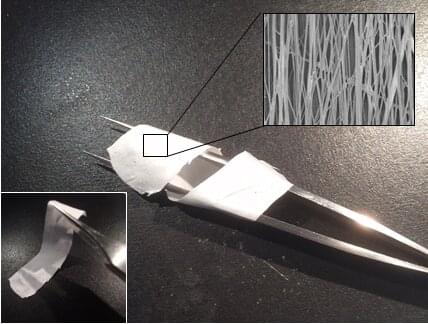Scientists had their hands full making sense of this one.



Summary: Researchers have discovered a new molecule that could increase the ultra-fast decision-making capabilities of computers. The simple molecule provides a new electronic circuit element in which complex logic is encoded in nanoscale material properties.
Source: University of Limerick.
An international team of scientists including researchers at University of Limerick in Ireland has discovered a new molecule that could further increase ultra-fast decision making in computers.

Of the more than 55,000 jobs, Jassy announced, over 40,000 will be in the United States, while others will be in countries such as India, Germany and Japan via its job fair ‘Amazon Career Day.’ In order to learn about Amazon job opportunities, click on their job page: amazon.jobs/in.
Amazon Career Day is a free event on September 16 2021 at 10:00am IST. “This interactive experience is for all job seekers, regardless of your level of experience, professional field, or background – whether you are interested in working at Amazon or elsewhere,” the company said in. a statement.
Jassy, in his first press interview since he ascended to Amazon’s top post in July, said the company needed more firepower to keep up with demand in retail, the cloud and advertising, among other businesses. He said the company’s new bet to launch satellites into orbit to widen broadband access, called Project Kuiper, would require a lot of new hires, too.
A spectacular portrait of the galaxy Centaurus A has been captured by astronomers using the Dark Energy Camera mounted on the Víctor M. Blanco 4-meter Telescope at Cerro Tololo Inter-American Observatory in Chile. This galaxy’s peculiar appearance—cloaked in dark tendrils of dust—stems from a past interaction with another galaxy, and its size and proximity to Earth make it one of the best-studied giant galaxies in the night sky.
The galaxy Centaurus A, which lies over 12 million light-years away in the direction of the southern-hemisphere constellation Centaurus (The Centaur), is the leading light of this striking image. This image provides a spectacular view of the luminous glow of stars and the dark tendrils of dust that hide the bright center of the galaxy. This dust is the result of a past galactic collision, in which a giant elliptical galaxy merged with a smaller spiral galaxy. As well as large amounts of gas and dust, Centaurus A’s dust lane contains widespread star formation, as indicated by the red clouds of hydrogen and by the large number of faint blue stars visible at each end of the dust lane.
The proximity and brightness of Centaurus A—it is one of the closest giant galaxies to Earth—make it one of the best-studied objects in the southern hemisphere night sky. Since its discovery in 1,826 scientists have studied the galaxy exhaustively with many different kinds of telescopes, revealing a variety of intriguing features. Radio telescopes reveal a colossal jet of matter spewing outward from the heart of the galaxy. This jet is accelerated to almost half the speed of light by a supermassive black hole at the center of Centaurus A, and its bright emissions at radio wavelengths make this galaxy one of the most prominent radio sources in the night sky. In fact, in July 2,021 the Event Horizon Telescope produced an image of a jet launching from the black hole in Centaurus A, which weighs in at 55 million times the mass of the Sun.

Physicists and engineers have found a way to identify and address imperfections in materials for one of the most promising technologies in commercial quantum computing.
The University of Queensland team was able to develop treatments and optimize fabrication protocols in common techniques for building superconducting circuits on silicon chips.
Dr. Peter Jacobson, who co-led the research, said the team had identified that imperfections introduced during fabrication reduced the effectiveness of the circuits.

Eight states will roll out a feature allowing users to add driver’s license and state IDs to Apple Wallet for iPhone and Apple Watch to use at security at participating airports, Apple announced Wednesday.
Arizona and Georgia are the first states to adopt the feature and Connecticut, Iowa, Kentucky, Maryland, Oklahoma and Utah will follow, though the company did not specify a timeline.
The news comes just months after Apple said at its Worldwide Developers Conference in June that it was working on the feature with the Transportation Security Administration. The update is a crucial step in Apple’s plan to replace physical wallets and will offer more convenience to travelers looking for a touchless airport experience, the company said.


No animals were harmed in the production of the synthetic muscle fibers, which are tougher than Kevlar.
Would you wear clothing made of muscle fibers? Use them to tie your shoes or even wear them as a belt? It may sound a bit odd, but if those fibers could endure more energy before breaking than cotton, silk, nylon, or even Kevlar, then why not?
Don’t worry, this muscle could be produced without harming a single animal.

A tumor in the human body is like a city at war, bustling with cancer cells, immune cells, blood vessels, signaling molecules and surrounding tissue. A simple census of these players will provide some basic information on their battle, but won’t tell you their organization or strategy.
A team of researchers has gained new insight into this organization. They have discovered that immune cells in some human colorectal tumors gather together in clusters, like soldiers mobilizing in formation. By using a unique combination of single-cell profiling and imaging technologies, along with newly developed data analysis approaches, the scientists found a level of spatial organization of cells not observed before in tumors.
The findings, published in Cell, point to networks of interacting immune cells in certain types of colorectal tumors that tend to be more readily “seen” by the immune system. This suggests that cancers containing these hubs may be more likely to respond to cancer drugs called immunotherapies, which spur the immune system to kill cancer cells. The scientists, from the Broad Institute of MIT and Harvard, Massachusetts General Hospital, MIT, the Evergrande Center for Immunologic Diseases at Brigham and Women’s Hospital and Harvard Medical School, and Dana-Farber Cancer Institute, say the study could shed light on how to make other tumors more responsive to such treatments.

The study investigated whether electrical therapy, coupled with exercise, would show promise in treating tendon disease or ruptures. It showed that tendon cell function and repair can be controlled through electrical stimulation from an implantable device which is powered by body movement.
Researchers at CÚRAM, the SFI Research Centre for Medical Devices based at NUI Galway, have shown how the simple act of walking can power an implantable stimulator device to speed up treatment of musculoskeletal diseases.
The results of have been published in the prestigious journal Advanced Materials.
The research establishes the engineering foundations for a new range of stimulator devices that enable control of musculoskeletal tissue regeneration to treat tendon damage and disease and sports injuries, without the use of drugs or external stimulation.